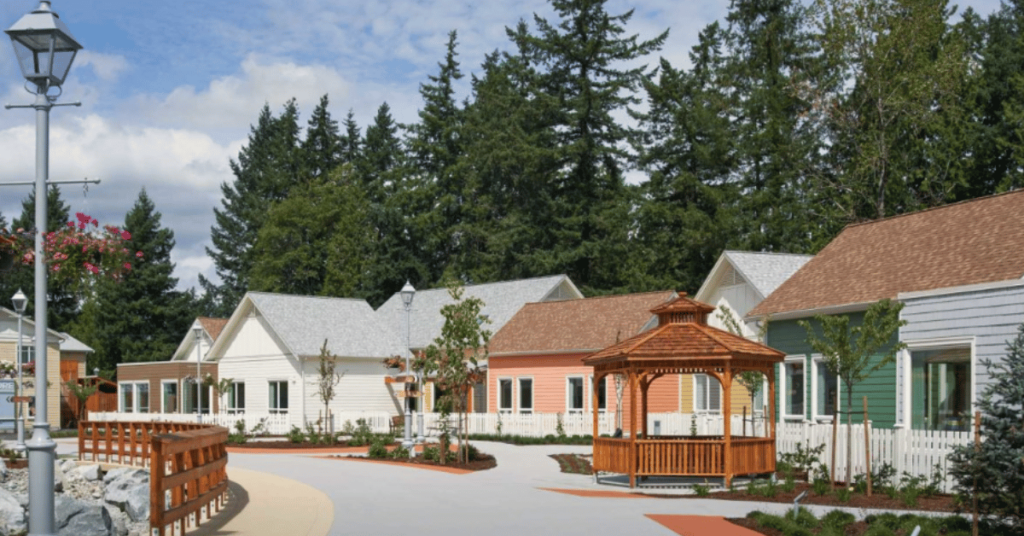The Alzheimer’s Society of Canada estimates that “350 people develop dementia every day, and by 2030, nearly 1 million Canadians will be living with dementia.” While these numbers are already quite alarming, they only tell part of the story. Behind each diagnosis is a ripple effect, impacting not only those living with dementia, but also the 350 families who face the emotional, physical, and financial challenges of supporting a loved one with dementia.
Caring for a family member with a confirmed diagnosis of dementia implies a profound life transformation. Balancing work, personal responsibilities, and caregiving can feel overwhelming and isolating.
Dementia care is inherently resource-intensive as things progress, demanding specialized training, long-term care facilities with staff trained on dementia behaviour management, and tailored home care services.
This growing challenge presents a valuable opportunity to reimagine how Canada supports both those living with symptoms of dementia and their families.
Investments in caregiver education, respite programs, community support programs as well as dementia-focused care homes can provide the necessary relief and peace of mind to family caregivers, and most importantly, significantly improve the quality of life of those living with dementia.
One such innovative response is the development of dementia villages—intentionally designed communities that prioritizes a compassionate, empowering, and inclusive approach to care. These dementia-friendly environments are purpose-built to foster independence, dignity, and a profound sense of belonging for those living with dementia no matter the stage of the journey.
What are Dementia Villages?
Dementia villages represent a much-needed creative response to how society should approach the care and well-being of individuals living with dementia.
Unlike traditional care homes, these villages are structured to resemble a typical community, complete with amenities such as restaurants, shops, hairdressers, and recreational areas like recreation centres, theatres and courtyards. This design allows residents to engage in daily activities that promote autonomy and dignity, fostering a sense of normalcy and well-being, both indoors and outdoors.
By integrating elements of normal daily life within a secure setting, these communities aim to reduce confusion while promoting social interaction, thereby improving overall well-being.
The Difference Between Traditional Long-term Care Homes and Dementia Villages
While both traditional care homes and dementia villages provide essential day-to-day support for individuals with cognitive challenges, their philosophies and environments differ significantly.
Traditional care homes often focus on medical care and supervision, whereas dementia villages prioritize creating a sense of normalcy and autonomy for residents, offering a more personalized, holistic approach. The necessity of dementia villages actually evolved from the limitations of these conventional care models that represent a hospital-like setting.
Traditional large long-term care homes frequently operate in a manner that may unintentionally exacerbate feelings of the person not feeling at ease which causes confusion, anxiety, and dependence on others to do things such as go outside for a walk. Clinical routines, unfamiliar facility-like surroundings, and restricted personal freedom, both indoor and outdoor, can contribute to stress, behavioural challenges, and a diminished sense of self.
In contrast, dementia villages are designed to mirror everyday life.
Caregivers, often dressed “homemakers” provide subtle guidance without overwhelming the residents. This environment encourages more freedom of movement in smaller home-like settings along with personalized routines. As a result, more meaningful engagement and relationships take place.
Advantages of Living in a Dementia Village
Promoting Independence and Choice
Dementia villages have philosophies they follow to help empower residents to make choices in their daily lives in order to maintain their independence. From deciding what to eat to participating in activities or strolling through the village paths, residents have the autonomy to live in alignment with their preferences and routines. This sense of control bolsters self-esteem, individuality and reduces anxiety.
Enhanced Quality of Life
The environment of a dementia village is crafted to foster joy and engagement. Activities like gardening, shopping, or having coffee at a village cafe simulate the rhythm of everyday life, bringing purpose and fulfillment to residents. Unlike institutional care homes, where options for stimulation may be limited, dementia villages offer diverse opportunities for physical, social, and cognitive enrichment.
A Familiar and Safe Environment
The design of dementia villages incorporates “intuitive” layouts that reduce confusion and the risk of dangerous wandering. Streets, pathways, and buildings with signs, are designed to feel familiar yet contained in a safe environment, ensuring residents can explore freely without fear of getting lost.
Supporting Social Connections
Feeling loneliness and experiencing isolation are common for older adults and particularly for people with dementia. Dementia villages encourage residents to interact organically with others, including peers with similar cognitive challenges, as well as the caregivers, and other visitors. Shared spaces like community centres, outdoor sitting areas, pathways, parks, and cafes help to facilitate natural social interactions, helping residents feel connected and valued.
Minimized Use of Medications
Traditional care homes often rely on medications to manage behavioural symptoms associated with dementia, such as agitation or aggression. In contrast, dementia villages emphasize a proactive, preventive approach rather than solely focusing on therapeutic interventions.
As we recognize Alzheimer’s Awareness Month and this year’s theme of “Reduce Our Risk,” it’s important to remember that the efforts to address dementia go beyond prevention for those without dementia. Reducing risk also means intentionally looking for solutions so that those already living with the condition live in a supportive environment that offers a powerful way of enhancing their quality of life and help delay further cognitive decline.
Dementia villages are more than a care option; they are a paradigm shift in how society treats individuals living with dementia. By recreating the familiarity and freedom of daily life within a safe, supportive community, dementia villages honour the humanity of their residents while addressing their unique needs.
As the global population ages and dementia diagnoses rise, investing in dementia villages becomes a compassionate and forward-thinking solution to ensuring dignity and joy for individuals living with this condition.
At Dementia Solutions, we’ve made it our mission to demystify dementia behaviour and continue to explore person-centred, creative, non-pharmacological solutions to manage dementia-related behaviours. We believe that awareness creation and skill-building through education is the most effective and powerful tool we have to promote and maintain the well-being of both the person with dementia and their caregiver.
If you’re a professional caregiver, consider becoming a Certified Dementia Care Provider!
Ready to deepen your understanding and be confident in your skills in managing changed behaviours due to dementia? Register for our Certified Dementia Care Provider program today and learn how to communicate with compassion, navigate challenging behaviours, and provide the best care for individuals living with dementia. Gain the tools you need to make a meaningful difference in the lives of those you care for. Sign up now and start transforming your caregiving approach!
If you’re a Family Caregiver, we invite you to join our Dementia Solutions Family Membership!
As a family caregiver, you don’t have to navigate the challenges of dementia alone. Join our Dementia Solutions Family Membership today and gain access to expert guidance, practical tips, and a supportive community of caregivers just like you. With resources, real stories, and valuable tools, we’re here to help you provide the best care while maintaining your well-being. Sign up now and take the next step toward confident, compassionate caregiving!
Any questions, simply send us an email at Info@DementiaSolutions.ca , and we’ll guide you through everything our programs have to offer. We look forward to helping you take the next step in your caregiving journey!
If you need support in your caregiving experience or would like to learn more about our educational opportunities, please reach out to us at Info@DementiaSolutions.ca and we would be more than happy to support you.
DISCLAIMER:
The contents of this blog are provided for information purposes only. They are not intended to replace clinical diagnosis or medical advice from a health professional.






One Response
I am pleased to see the articles about villages and the reduced use of medication for Dementia sufferers!